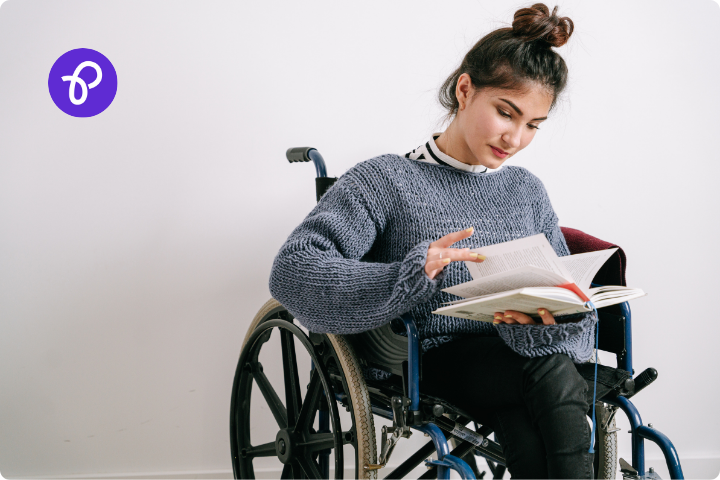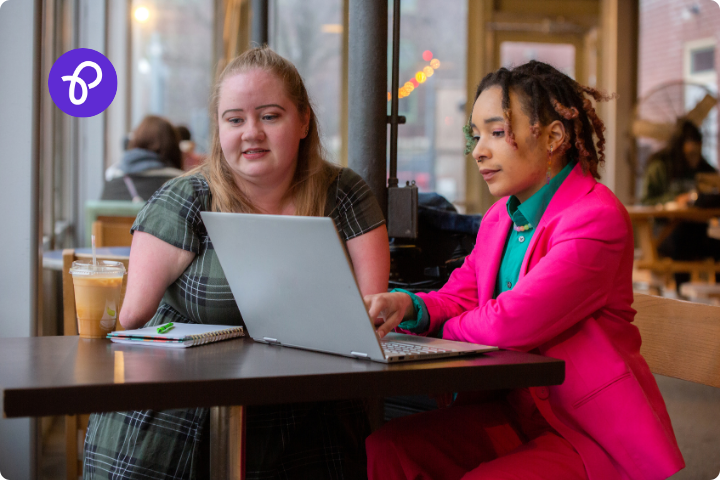All Articles
8 min read
How to Apply for a Charitable Grant for Disabled People
Written by
Georgina, Founder of Purpl
Published on
January 9, 2025

How to Find Grants for Disabled People
Hi, I’m Georgina, founder of Purpl Disabled Discounts. I often hear from our members and our social media followers that they got rejected for a Disabled Facilities Grant, so when I discovered that there are a wide range of charity grants available to disabled people in the UK, I wanted to let everyone know.
Accessing financial support through charity grants can significantly improve the quality of life for disabled people and their families. Many organisations across the UK offer grants specifically designed to help with mobility aids, home adaptations, education, and general living costs. This article provides a step-by-step guide on how to apply for charity grants in the UK for disabled people.
In This Article
- The Extra Costs of Living for Disabled People
- What are Charity Grants?
- Where to Find Suitable Grants
- Eligibility Requirements
- Are Grants Means Tested?
- How to Prepare Supporting Documents
- The Application Process
- How to Seek Help
- Follow Up on Your Application
- What to Do If Your Application Is Rejected
- Stay Informed
- Other Purpl Guides to Support for Disabled People
- Final Thoughts
- Frequently Asked Questions
The Extra Costs of Living for Disabled People
Living with a disability in the UK comes with significant additional expenses, placing disabled people and their families into financial struggles. Research consistently highlights that disabled people face higher costs of living compared to non-disabled people, this is often referred to as the ‘disability price tag.’
These costs stem from the need for specialised equipment, personal care, home adaptations, and transportation. On average, disabled people in the UK incur extra living costs of £1010 a month, according to data from Scope, the disability equality charity.
Essential items and services for disabled people are often more expensive than their standard equivalents. Wheelchairs, mobility scooters, or stairlifts can cost thousands of pounds, with limited coverage from the NHS and government support schemes. Additionally, many disabled people require personal assistants, carers, or private physiotherapy sessions, all of which contribute to ongoing financial pressures.

Even everyday tasks, such as grocery shopping or household maintenance, can cost more when accessible or specialised services are required. These higher living costs disproportionately affect disabled people on lower incomes, pushing many into poverty or debt despite receiving benefits like Personal Independence Payment (PIP).
Energy costs also represent a major challenge for disabled households. Many disabled individuals require heating for longer periods to manage health conditions or use energy-intensive medical equipment. Lots of disabled people have extra laundry needs related to their impairments, meaning higher water and electricity usage. Coupled with rising energy prices, this can result in substantial bills.
Furthermore, accessible transportation options, such as adapted vehicles or taxis, often cost more than public transport, further straining budgets. These additional costs are not luxuries but necessities for disabled people across the UK.
Due to all these reasons and more, finances can be a major point of stress for disabled people and their families. At Purpl, we understand these extra costs because we are founded by a disabled woman and have disabled staff members. We are living the same lives as others in the disabled community and this is why, alongside creating incredible discounts from the brands you love, we have a whole range of guides in other areas you can save money, claim the benefits you are entitled to and here we look at charity grants that may offer support where needed.
What are Charity Grants?
Charity grants are offered by organisations to assist people facing specific challenges. For disabled people, these grants can help cover:
- Mobility aids (e.g., wheelchairs, scooters)
- Home modifications (e.g., stairlifts, ramps)
- Respite care and therapy costs
- Educational or training opportunities
- Everyday essentials or emergency financial support
Each charity has unique eligibility criteria, so it’s important to research and identify the most suitable options.
Where to Find Suitable Grants for Disabled People
You can search for grants with our Purpl Grants Finder (powered by Turn2us) to help find local or national charities offering grants in the UK. Turn2us is a national charity offering information and practical support to people facing financial insecurity.
There are numerous other charities in the UK providing grants for disabled people. Some prominent places to search for grants are:
- The Family Fund: Provides grants to families with disabled children under 18 for essential items like sensory toys or household appliances.
- Motability Foundation: Assists with leasing a car or powered wheelchair.
- Disability Grants: Lists a wide range of charities offering grants for various purposes.
You can use online tools, charity directories, or consult with social workers to identify organisations that align with your needs.
Eligibility Requirements
Eligibility for charity grants for disabled people in the UK typically depends on a combination of factors, including the nature of the disability, financial circumstances, and the specific purpose of the grant.
Most charities require applicants to provide proof of disability, such as a medical certificate, a diagnosis letter from a healthcare professional, or evidence of receiving disability-related benefits like Personal Independence Payment (PIP) or Attendance Allowance.
Some grants are targeted at specific groups, such as children, older adults, or individuals with certain conditions (e.g., multiple sclerosis, autism, or mobility impairments).
Financial need is often a key criterion, with applicants required to demonstrate limited income or savings, sometimes through bank statements or proof of unemployment.
In some cases, grants are only available to residents of certain regions or people referred by professionals like social workers or occupational therapists.
Understanding the eligibility criteria of each charity is essential to ensure a successful application. Every charity has specific criteria to determine who can receive their grants. Before applying, review the eligibility conditions, which may include:
- Proof of disability (e.g., medical certificate, Personal Independence Payment [PIP])
- Residency requirements (e.g., must live in the UK)
- Income thresholds or proof of financial hardship
- Age limits (e.g., grants for children or older adults)
Understanding these requirements ensures you don’t waste time applying to grants you don’t qualify for.
Are Grants Means Tested?
Most charity grants for disabled people are means-tested, meaning the applicant’s financial circumstances are assessed to determine eligibility. This is to ensure that support goes to those most in need of financial help and to help as many people as possible with the limited charitable funds available. If you have a high income or savings, this is taken into consideration with your application. However, this depends on the charity and the purpose of the grant.
Common Factors in Means Testing:
- Income level: Some grants require proof of a low income or financial hardship.
- Savings and assets: Charities may check savings accounts, properties, or other financial assets to ensure funds are not available elsewhere.
- Benefit status: Receiving certain means-tested benefits, such as Universal Credit or Pension Credit, may improve your eligibility.
If you do not receive a Government means-tested benefit, charities may carry out their own means test. This will involve looking at the financial circumstances, including household income and savings, of the disabled person and their family.
It’s important to read the eligibility criteria for each grant to understand whether means testing applies. All charitable funds have specific qualifying rules (or eligibility criteria) that an individual has to meet in order to get help from that fund. Each fund’s qualifying rules will be specific to them. In general, you will have to be in financial need or on a low income. Directories like Turn2us and Disability Grants can help filter options based on financial circumstances.
How to Prepare Supporting Documents
Preparing the necessary documents is a crucial step in applying for grants for disabled people in the UK. Most charities require clear evidence to assess both the disability and financial need of the applicant.
Start by gathering proof of disability, such as medical reports, a diagnosis letter from a doctor, or evidence of receiving disability-related benefits like Personal Independence Payment (PIP) or Disability Living Allowance (DLA). Financial documents, such as recent bank statements, proof of income, or letters showing receipt of benefits, may also be required to demonstrate financial hardship.
If the grant is for a specific purpose, such as home adaptations or mobility aids, include supporting documents like quotes from suppliers or recommendations from occupational therapists.
Some charities may also ask for a reference or supporting letter from a professional, such as a GP, social worker, or caseworker, to validate the application.
Ensuring all documents are up-to-date, accurate, and organised will make the application process smoother and increase the likelihood of approval.
Most charities will require you to provide documentation to verify your eligibility. Commonly requested documents include:
- Medical records or a letter from a healthcare professional
- Proof of disability benefits, such as PIP or Attendance Allowance
- Bank statements or proof of financial hardship
- A letter explaining your need for the grant and how the funding will be used
Gathering these materials beforehand will speed up the application process.

The Application Process
Follow the instructions provided by the charity for submitting your application. This may involve:
- Filling out an online or paper-based form
- Writing a personal statement or letter explaining your situation
- Submitting supporting documents
- Asking a professional (e.g., GP, social worker) to provide a reference
Pay close attention to deadlines and ensure you provide all requested information. Missing details or submitting an incomplete application can delay or disqualify your application.
Seek Help If Needed
Applying for grants can be a complex and time-consuming process, but there are numerous resources available to help disabled people navigate the application process.
Local authorities and charities often provide advice services, while organisations like Citizens Advice can offer one-on-one support to identify relevant grants and complete application forms. Social workers, occupational therapists, or caseworkers may also assist by providing necessary documentation or writing supporting letters.
Online platforms such as Turn2us and Disability Grants allow users to search for grants and provide guidance on eligibility and submission requirements. Additionally, some disability charities offer helplines or application support teams to answer questions and help applicants avoid common mistakes.
Seeking help not only ensures a more thorough and accurate application but also reduces the stress associated with the process, improving the chances of a successful outcome.
- Local Authorities: Contact your local council for advice on available grants or funding.
- Citizens Advice: Provides guidance on navigating the application process and finding relevant charities.
- Purpl Grant Finder powered by Turn2Us
- Disability Grants
- Scope Helpline
- Social Workers or Healthcare Professionals: They can write supporting letters or help you find resources.
Follow Up on Your Application
After submitting your application, keep track of it by:
- Taking note of submission deadlines and confirmation receipts.
- Following up with the charity to check on the status of your application, if necessary.
- Being prepared to provide additional information or documentation if requested.

What to Do If Your Application Is Rejected
Not every application will be successful, but don’t be discouraged. If your application is rejected:
- Ask for feedback from the charity to improve future applications.
- Reapply if your circumstances change or if the charity permits re-submission.
- Look for alternative funding sources, as there are many organisations offering grants.
Stay Informed
Charity grants are often updated or newly introduced to address emerging needs. Stay informed by:
- Signing up for newsletters or updates from relevant charities.
- Regularly checking grant directories like Turn2us or Disability Grants.
- Joining online forums or social media groups for disabled individuals and their families, where members often share tips and resources.
- Check in on Purpl Life, we are a go to hub for disability information in the UK
- Join our Private Facebook Group to chat with other Purpl Members about grants
Other Purpl Guides to Support for Disabled People
Purpl is the UK’s first disabled discount site, and alongside incredible deals, offers and discounts specifically for disabled people, we also have a range of information that can help the disabled community save money in all areas of their lives.
Whether it is how to apply for benefits like Personal Independence Payments (PIP) or Employment Support Allowance (ESA), accessible travel through the Disabled Persons Railcard, Disabled Bus pass, TaxiCard or Disabled CoachCard or saving money on car travel with Car Tax Discounts and Toll Concessions, or other grants like the Disabled Facilities Grant, we have you covered!
If you prefer your information in video form, make sure you follow Purpl Discounts on tiktok and join over 1 million people who watch Georgina’s videos and guides!
Also you can follow us on Facebook and Instagram for daily posts on everything from our latest deals to a bit of inspiration for the day or to share your little wins and favourite disabled discounts, our community is a safe, supportive and friendly place for you.
Final Thoughts
Charity grants are a lifeline for many disabled people in the UK, providing much-needed support for essential items and services. By understanding the application process, identifying suitable organisations, and seeking assistance when needed, you can increase your chances of securing funding.
Remember, persistence and preparation are key. With the right resources and guidance, you can navigate the grant application process effectively and access the support you need.
Frequently Asked Questions
How do I know if I am entitled to any grants?
You can use our Purpl grant search tool to help find local or national charities offering grants in the UK.
Where can I get help with applying for grants?
Applying for grants can be a complex and time-consuming process, but there are numerous resources available to help disabled people navigate the application process. Find a list of places to seek help from here.
Do I need to be on benefits to claim grants?
Not necessarily, eligibility for charity grants for disabled people in the UK typically depends on a combination of factors, including the nature of the disability, financial circumstances, and the specific purpose of the grant.
Most charities require applicants to provide proof of disability, but if you do not claim disability-related benefits like Personal Independence Payment (PIP) or Attendance Allowance, that evidence could be through a medical certificate or a diagnosis letter from a healthcare professional.
Other Related Articles on Financial Support for Disabled People
Purpl Benefits Calculator
How to Apply for Access to Work
How to Get Help as a Disabled Student
The CEA Card – Disabled Person’s Cinema Card
